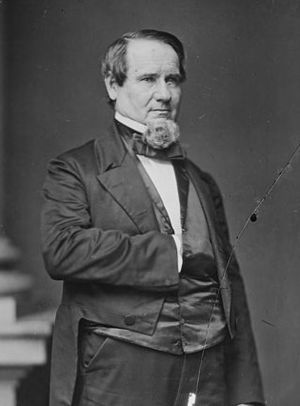
Aaron Venable Brown

Aaron Venable Brown, lawyer, congressman, governor, cabinet officer, was born Aug. 15, 1795, in Brunswick County, Va. He received a good education in the public and private schools of his native state. He served for a number of years in the state legislature of Tennessee; and in 1839-45 he was a representative from Tennessee to the twenty-sixth, twenty-seventh and the twenty-eighth congresses. In 1845-47 he was the tenth governor of Tennessee. In 1857-59 he was postmaster-general; and filled numerous other positions of trust and honor. He died March 8, 1859, in Washington, D.C. [Herringshaw's National Library of American Biography: Contains Thirty-five Thousand Biographies of the Acknowledged Leaders of Life and Thought of the United States, by William Herringshaw, 1909 - Transcribed by TK]
Aaron V. Brown was born in Brunswick County, Virginia, one of eleven
children of the Rev. Aaron Brown, a Methodist minister and his second
wife, Elizabeth Melton. Brown attended the University of North Carolina
at Chapel Hill and graduated in 1814, the valedictorian of his class.
After moving to Tennessee with his family, he studied law with a
distinguished jurist in Nashville. He was admitted to the bar in 1816
and became a law partner with future president James K. Polk. Over the
next two decades Brown would serve in both houses of the Tennessee
legislature. In 1839, he was elected to the U.S. House of
Representatives and served three terms. He supported the annexation of
Texas in 1843.
Although Brown initially planned to return to
private life after his third term in Congress, he begrudgingly accepted
the Democratic nomination for Governor of Tennessee. He won by a razor
thin margin. During his time as governor, Brown’s call for 2800
volunteer soldiers for the Mexican-American War yielded 30,000
responses, solidifying Tennessee’s reputation as the “Volunteer State.”
Brown attended the 1856 Democratic National Convention where he was
considered a possible vice presidential nominee. The following year,
newly elected president James Buchanan appointed Brown to be Postmaster
General. Three of the seven members of Buchanan’s cabinet were connected
to Epiphany. Brown died while in office on March 8, 1859. His funeral
was at Epiphany with his interment several days later in Nashville.
If you have questions, contributions, or problems with this site, email:
Coordinator - Rebecca Maloney
State Coordinator: Jeff Kemp
Asst. State Coordinators: Vacant
If you have questions or problems with this site, email the County Coordinator. Please to not ask for specfic research on your family. I am unable to do your personal research.